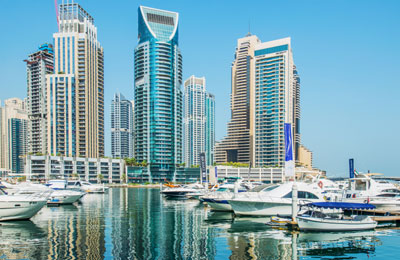
GCC construction boom ... reflected in top-quality
infrastructure projects.
GCC projects to hit record $172bn in 2015
DUBAI, April 13, 2015
The value of contracts placed in the GCC will rise to $172 billion in 2015 despite lower oil prices, marking a value higher than in 2014 and a new record for the region, said an industry expert.
This is good news for the market which feared major reductions in government spending on projects in 2015, added Ed James, content and analysis director at Meed Projects, a Mena leader in providing market information.
The forecast means that demand for material and skills will continue to grow. This will test the capacity of the supply chain to meet the needs of the construction industry.
“The scale and quality of the GCC construction boom is reflected in the growing number of top-quality infrastructure, building and industrial projects being completed across the region,” said Meed Quality Awards for Projects judges panel chairman Edmund O’Sullivan.
“It is also measured by the very impressive finished projects nominated for the fifth annual Meed Quality Awards for Projects which will be announced and presented in Dubai on May 27.
“This shows that the GCC construction industry and its clients have the capacity to tackle challenges that would defeat most other parts of the world.
“It is now facing testing times but I’m confident from what I’m seeing that all sides of the market recognise more comprehensively than ever before that the right answer is greater collaboration across the supply chain and between clients and suppliers,” O’Sullivan added.
Saudi Arabia is the region’s biggest project market. Construction leaders say the kingdom’s building boom will compound longstanding challenges the industry faces.
“There are a number of issues facing the construction industry in Saudi Arabia,” said Faisal Alsharif, assistant secretary general for projects at the Riyadh Chamber of Commerce & Industry and a judge at Meed Quality Awards for Projects.
“Rapid changes in regulations and policies are a major challenge facing investors and contractors involved in these projects. Finance is a major issue as well, with payments delays making cash-flow planning and management a real challenge.
“Human resource shortages are another big issue and not only in projects. But it’s clearer in projects. The lack of adequate and qualified labour and technicians can result in project failure in the form of cost and time overruns,” he added.
Qatar is expected to be the fastest-growing projects market in 2015. A total of $30 billion worth of new contracts are to be awarded during the year and a similar figure in 2016 as the country accelerates its preparations for the Fifa World Cup finals in 2022.
About $135 billion worth of contracts are due to be awarded in Qatar in 2015-20. This is on top of about $100 billion placed since it was appointed in 2010 to host the finals.
“The two big challenges facing the Qatar construction industry are insufficient logistics facilities needed to support the delivery of projects and finding the right resources including labour and engineering skills,” said Qatar Society of Engineers chairman Ahmed al-Jolo.
Some construction leaders working in Qatar say shortages of steel, asphalt and gabbro are possible in 2016.
The new Hamad Port is due to start operating in July, more than six months ahead of schedule. This will relieve pressure on Mesaieed industrial port which is now the principal sea gateway to Qatar, noted Al-Jolo.
“Because of the complexity and interaction among the projects in Qatar, choosing the right procurement method is a challenge,” he said. “Knowledge of project management methodologies is insufficient among staff responsible about project delivery. More training of project managers is needed so they can apply the best, well-known methodologies.”
Qatar and Saudi Arabia both have substantial private and public savings which are more than enough to maintain capital investment despite lower oil prices. For Oman, the fall in oil constitutes a serious challenge for the government. But its project agenda is more modest and Meed Projects forecasts about $15 billion worth of new contracts should be placed in 2015.
The Khazzan tight gas project, the largest in Oman’s history, is being implemented and financed by BP. And the government has a well-developed reputation for effectively mobilising private finance into power and water schemes.
The sultanate, like other GCC states, is being more acutely tested by soaring demand for talent, says Sulaiman Al-Hudaili, managing director of Seiraf and Star Engineering Consultancy.
“The key issue is the availability of skilled people,” he said. “The material is readily available. The industry needs to pay more attention to proper planning. Contractors need to co-ordinate and the government needs to be practical in view of the scale of the projects that are coming.”
There’s no single solution to the challenges the GCC projects sector faces. Construction industry leaders are calling on clients and service providers to work together more effectively. This will involve sharing more medium-term information about GCC demand for material, equipment and labour.
Government clients should be more open to innovative and unconventional procurement methods including design and build, an approach being used heavily in Qatar, they say. The supply chain needs attention and the capital structure of local construction companies should be strengthened.
Sustainability will be one of the award categories at the Meed Quality Awards for Projects in association with Mashreq which will be taking place on May 27 in Dubai, UAE during the Meed Construction Leadership Summit at the Address Hotel Dubai Marina. – TradeArabia News Service







